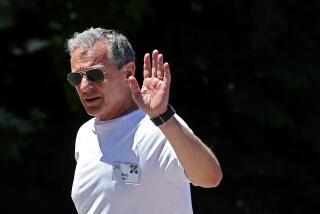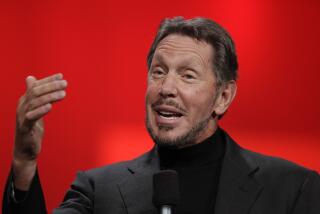Eisner Likely to Weather This Latest Storm
Michael Eisner is a survivor.
Sunday’s surprise resignation of Roy E. Disney from the Walt Disney Co. board of directors is the latest storm in Eisner’s 19-year reign as the company’s chairman and chief executive. He has faced plenty of hurricane-force winds before, and he has weathered all of them.
“My strength is coming up with two outs in the last of the ninth,” Eisner once said. “I’m very competitive. I love coming back.”
In many ways, Eisner has been scrapping -- and successfully coming back -- since he was a 7-year-old boy thrust into a boxing ring at summer camp to spar with a much bigger 9-year-old opponent. Despite the size difference, Eisner held on.
Then there was the time, nine years ago, when he was wheeled into an operating room for heart bypass surgery -- a scant few months after his trusted lieutenant died in a helicopter crash.
Experts said Sunday that it was too soon to predict whether Eisner’s grip on the company he molded into a media empire would be loosened by Roy Disney’s call for his resignation. Some in Hollywood and on Wall Street say they don’t expect that the 61-year-old chairman will take his final bows anytime soon.
“He has obeyed the iron rule of survival,” said Martin Kaplan, an associate dean of USC’s Annenberg School for Communication and a former production executive at Disney Studios. “A careful politician knows how to count, and Eisner seems to have the supporters he needs on the board.”
Throughout his tenure at the helm of the world’s best-known family entertainment company, Eisner has mastered the art of boardroom politics, inoculating himself from serious threats from within. With a grasp of details big and small, he has been able to ride his many successes without taking a fall for the mounting liabilities.
During the last nine years, Eisner has been at the center of controversies and miscues that might have ushered many a chief executive toward the exit.
First there was the Michael Ovitz fiasco. The famous Hollywood power broker served one turbulent year as Disney’s president. When he left the company in 1996, Ovitz took a payout that, including stock options, exceeded $100 million, an amount Eisner struggled to justify to unhappy board members.
Then came the Jeffrey Katzenberg debacle, which grabbed headlines around the globe. Instead of agreeing to a settlement early on, Eisner chose to duke it out in court with the former studio head. On the stand Eisner was forced to concede that he once said of Katzenberg: “I hate the little midget.” Disney soon settled with Katzenberg for $270 million, to the chagrin of investors who said the matter should have been resolved quietly years before.
More recently, Eisner, a former TV executive, has watched his ABC network lose hundreds of millions of dollars. Since buying the network in 1996, Disney has not been able to return it to its former glory. Three years ago, ABC burned out its mega-hit “Who Wants to Be a Millionaire” by running it as many as four nights a week -- without using the profits to seed a crop of new shows.
And then there’s the exodus of dozens of senior executives, many of whom have prospered in new jobs.
Among them:
* Katzenberg left in 1994 and became a partner in rival studio DreamWorks SKG.
* Disney Studios Chairman Joe Roth resigned three years ago and founded Revolution Studios.
* The head of the Disney theme parks, Paul Pressler, resigned last year to become chief executive of Gap Inc.
* One of the architects of Disney cable channel ESPN’s success, Steve Bornstein, left last year and is now in charge of the NFL Networks.
In his blistering letter, Roy Disney blamed Eisner for “the creative brain drain of the last several years, which is real and continuing, and damages our company with the loss of every talented employee.”
Roy Disney has been one of Eisner’s most vocal critics on a board that has long been faulted by institutional investors for being too soft and too close to Eisner. At various times, the board has included Eisner’s personal lawyer, his architect and the principal of the elementary school once attended by one of his children.
Business Week dubbed Walt Disney Co.’s board the worst in America in 1999 and 2000.
But Eisner hung on, in part, because there is no heir apparent, experts say. Roy Disney faulted Eisner for failing to groom a successor.
“He’s very tough to replace,” said David W. Miller, a Los Angeles-based media analyst with investment banking firm Sanders Morris Harris. “It’s very difficult to find a guy in this town who understands the creative issues and who also understands a balance sheet and who can make complex financial decisions. There are few people on this planet who can do that on a high level, and Michael Eisner is one of them.”
Eisner’s efforts have paid huge dividends. Forbes magazine listed his wealth at more than $630 million, with most of that coming during his Disney stewardship. Scores of investors have benefited too.
“He’s made a lot of people extremely rich over the years, and they appreciate that fact,” Kaplan said. “His depth of support comes not only from a personal level but also from a financial one.”
More to Read
The biggest entertainment stories
Get our big stories about Hollywood, film, television, music, arts, culture and more right in your inbox as soon as they publish.
You may occasionally receive promotional content from the Los Angeles Times.











